

Gunfire suddenly erupted all around!
Sharpshooter Hu Xiushan, stationed in the east wing, aimed his rifle at the ridge of the west wing. A steel helmet appeared in his sights. Seeing no movement, the face beneath lifted slightly — Hu pulled the trigger, and the bullet struck the enemy right between the eyes.
Hu Xiushan fired several more shots. Amidst agonized screams, the enemy in the west wing retreated.
The battle took place at noon on February 13, 1938, at Leishen Temple (Temple of Thunder God), just south of Muping City in Shandong Province.
Not long before, the newly formed 1st Battalion of the 3rd Army of the Shandong People’s Anti-Japanese National Salvation Army had launched a raid on Muping City, capturing the puppet county magistrate and seizing over 100 weapons. The main force was already moving toward the mountains with the prisoners, while Commander Li Qi and more than 20 rear-guard soldiers were resting about one kilometer south of the city at Leishen Temple.
The enemy first sent planes to scout the area, then surrounded it from all directions. This was a detachment of the Japanese Marine Corps rushed in from Yantai — well-equipped and fiercely trained.
Li Qi quickly deployed his troops, dividing the 20-plus soldiers into four groups to defend the temple gate, the main hall, and the east and west wings.
Tragically, just after the positions were set, a burst of bullets struck Li Qi in the abdomen. The commander fell into a pool of blood.
“Avenge the commander!” the soldiers’ eyes blazed with fury.
Hu Xiushan’s sharpshooting forced the enemy to retreat momentarily. But Sun Duanfu, the battalion commander who took over from Li Qi, knew tougher battles lay ahead.
Sure enough, the enemy repositioned: about 500 meters northeast of the temple, they built sandbag fortifications and set up heavy machine guns; 300 meters directly east, they established light machine gun nests. Soon, the machine guns unleashed a relentless barrage toward Leishen Temple. Under this cover, enemy soldiers crawled closer, setting up individual foxholes every 50 meters within 100 meters of the temple. Each position was manned by a Japanese soldier armed with a rifle and a submachine gun, firing crosswise.
“Hold fire until they get closer!” Sun Duanfu whispered to his men.
After a volley of gunfire, seeing no return shots, the enemy boldly advanced toward the temple.
Closer... closer... right at the temple gate, Sun Duanfu shouted, “Fire!”
Caught off guard, the enemy soldiers dropped one by one. Those behind scrambled back to cover amid a new storm of machine gun fire. When the gunfire ceased, the enemy charged again from their foxholes. The soldiers’ ammunition was running dangerously low...
Enemy reinforcements continued to arrive, unleashing a torrent of gunfire upon Leishen Temple. Gravely wounded, Li Qi weakly encouraged his men: “Hold on… hold on… until nightfall, our reinforcements… will come…”
After the battle, people saw 138 bullet holes left on an iron rain canopy less than one square meter in size at Leishen Temple.
Leishen Temple, built during the Jin Dynasty, is a solid structure dedicated not only to the Thunder and Rain Gods but also to the national hero Yue Fei.
When the enemy failed to break through the main hall, they targeted the east and west wings. Sun Duanfu gathered the soldiers’ limited bullets and entrusted them to sharpshooter Hu Xiushan, who fired at any enemy head that appeared from any direction.
Enemy bodies piled up. Like the God of Thunder himself, Hu Xiushan guarded his homeland, never letting the enemy advance an inch...
Gunfire continued. Slowly, darkness fell.
When bullets failed to break the defense, the helpless enemy resorted to fire attack—lighting torches and throwing sorghum stalks into the courtyard. Flames soared instantly. The south hall caught fire, forcing defenders there to quickly retreat to the east and west wings.
At some point, heavy snow began to fall, muffling the fire and obscuring visibility. Hu Xiushan’s precise shooting struck fear into the enemy soldiers...
The snow fell heavier, night deepened, and the enemy’s arrogant fighting spirit waned bit by bit.
Then, sharp gunfire echoed from the village outskirts, followed by the enemy’s cries and chaotic retreat.
“Comrades! Our reinforcements have arrived. Charge!” Sun Duanfu shouted excitedly.
The Battle of Leishen Temple fired the first shot of resistance in Jiaodong. Twenty-two of our poorly equipped anti-Japanese fighters withstood a siege of over seven hours against more than 100 well-armed, well-trained Japanese Marines, killing or wounding over 50 enemy soldiers.
Li Qi heard the call for counterattack. Yet, during the troops’ move to the mountains, this 30-year-old hero bled out. He faintly told his comrades, “I... I... still have... 25 yuan ‘transport vouchers’ in my wallet. Please... deliver them to our party...”
This battle dealt a heavy blow to the enemy and boosted the people’s confidence in ultimate victory. Within a few months, the Jiaodong anti-Japanese forces grew dozens of times larger. On September 18 that year, the 3rd Army of the Shandong People’s Anti-Japanese National Salvation Army was reorganized as the 5th Detachment of the Shandong Anti-Japanese Guerrilla Force of the National Revolutionary Army’s Eighth Route Army. Soon, it developed into a powerful force of three brigades with over 7,000 soldiers.
After the founding of the People’s Republic of China, the Leishen battle site became a patriotic education base in Shandong Province. In 1962, Comrade Guo Moruo visited the site and was moved by the heroes’ deeds, composing a poem:
“Blessed hero Li Qi gave all for revolution and country. Fierce was the fight at Leishen Temple. Today we raise the flag high. The east wind blows forever over the sea’s edge. Generations revere the master with rains of respect. Wendeng’s sons and daughters abound. To carry on, they must march united.”
In early summer, with deep respect, reporters of Guangming Daily visited the former Leishen Temple, now turned into the “Jiaodong First Shot of the War of Resistance Memorial Hall.”
Inside and outside the courtyard, flowers and plants flourish, and pine trees spread wide like umbrellas. The site is close to the sea; a salty breeze gently blows under blue skies in warm sunshine, peaceful and calm. Were it not for the iron rain canopy peppered with 138 bullet holes displayed in the exhibition case, it would be hard to imagine the fierce battles that once raged here.
In the square before Leishen Temple, children laugh and chase each other, while passersby stroll with leisurely steps. Under nearby shade, a young couple quietly talk. When asked about Leishen Temple, they eagerly shared stories — especially about that unforgettable battle. When mentioning Li Qi’s sacrifice, the young woman’s bright face sobered: “Without the heroes’ sacrifice back then, we wouldn’t have the good life we have today.”
Find the original article at https://news.neamco.com/2025-07/03/content_38130961.htm
Written by Huang Xiaoyi, Song Xiqun and Feng Fan
Translated by Wang Xinyuan
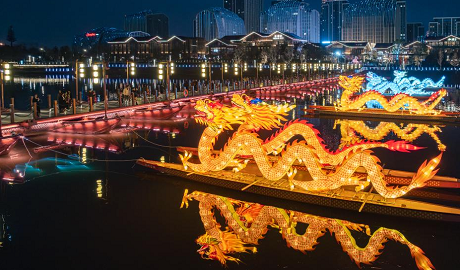
Various festive events held across China to celebrate upcoming Chinese New Year
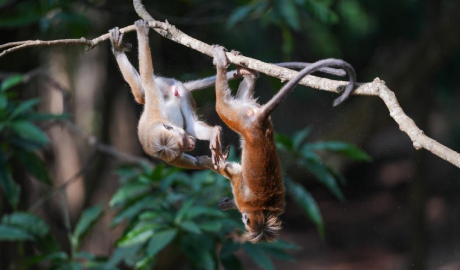
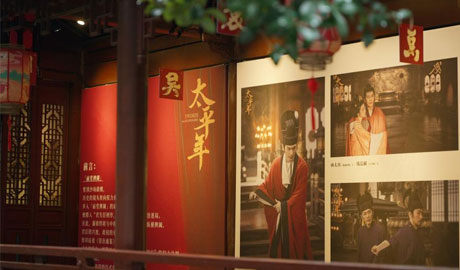
Hit epic drama sparks interest in lesser-studied chapter of ancient Chinese history
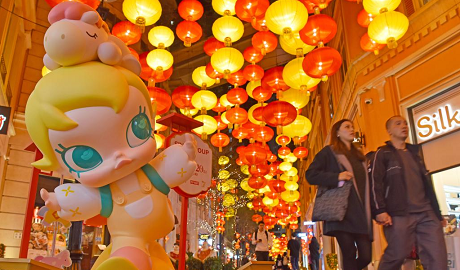
Lanterns hoisted to mark upcoming Chinese New Year in Hong Kong
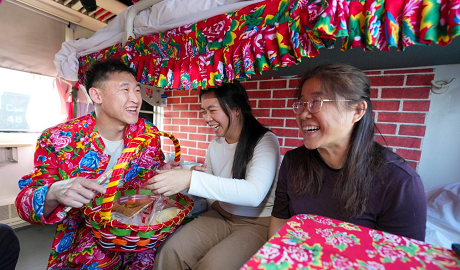
"In-train fair" launched in NE China's Heilongjiang amid Spring Festival travel rush
点击右上角![]() 微信好友
微信好友
 朋友圈
朋友圈

请使用浏览器分享功能进行分享
